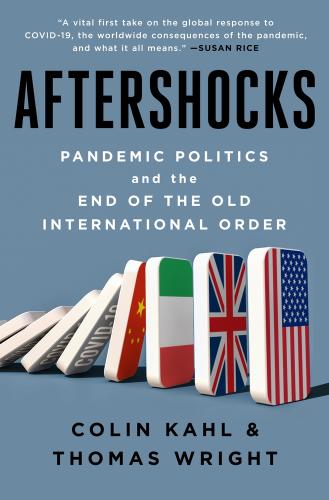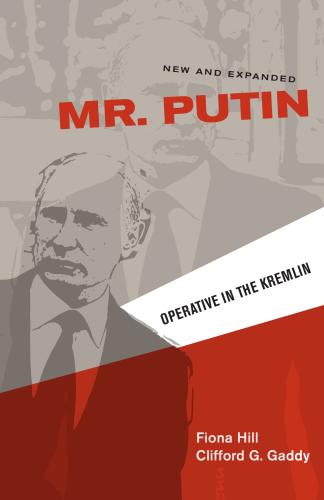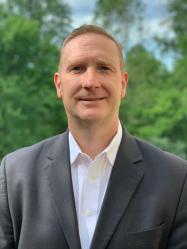On November 6, Washington University in St. Louis hosted the first in a series of debates on America’s changing role in the world, convened by the Foreign Policy program at Brookings and the Charles Koch Institute. The goal of these debates, to be held in cities around the United States, is to foster a vigorous, civil, and constructive national discussion on the future of American foreign policy.
Below, the debate participants—Michael O’Hanlon of Brookings, Christopher Preble of the Cato Institute, William Ruger of the Charles Koch Institute, and Constanze Stelzenmüller of Brookings—reflect on why they wanted to participate, what surprised them (and didn’t) about the debate, and more.
The next debate—which is co-hosted by the Brookings Foreign Policy program and the Charles Koch Institute, in partnership with Politico—is in Las Vegas on December 11. You can learn more and watch the live webcast here.
 1Why did you want to participate in a Brookings-Charles Koch Institute debate?
1Why did you want to participate in a Brookings-Charles Koch Institute debate?
Constanze Stelzenmüller: I thought it was a great way to take the debate about the fundamentals of American foreign policy beyond the Beltway.
Christopher Preble: For me, it was a no brainer. These are two first-rate organizations, and I knew that they would put on a terrific program. But the main draw was the other participants—Mike, Constanze, and Will—people that I know and respect very much. I knew that it would be a high-level discussion, and not descend into ad hominem attacks. I wasn’t disappointed.
Michael O’Hanlon: Last year’s election shows vividly just how much Americans want to address fundamental questions about the nation’s role in the world. And the Charles Koch Institute has serious people, in house and in its broader networks, who bring fresh and usefully challenging perspectives to bear on this central question.
William Ruger: It is important for educational institutions and scholars to model civil discourse, especially in turbulent times when incivility and division in our country has been strikingly prominent. Moreover, connecting with people across the nation and engaging with their interests, concerns, and questions helps close that divide.
The partnership with Brookings has allowed us to bring together so many leading thinkers, including Mike and Constanze, who have much to add to a national conversation on foreign policy. And Chris has been a long-time partner in challenging the status quo and advancing new ideas.
2Many who watched the debate were surprised by the common ground that scholars from Brookings, CATO and the Charles Koch Institute seemed to find. Were you surprised? Or do you think forthcoming debates that dive deeper into various issues will expose greater disagreement?
Ruger: The fault lines between those of us who would like to see greater realism and restraint in U.S. foreign policy and those who favor “primacy” or “deep engagement” don’t preclude bridges across those lines where we agree on common-sense policies that will best keep America safe and prosperous. You saw that with the broad agreement we shared on the importance of liberalizing trade and on how none of us favor isolating America from the rest of the world. Moreover, Mike, Chris, and I agree that further expansion of NATO would not make America safer. The primary disagreement among the panelists in St. Louis—and likely in other cities ahead in the series—comes down to the extent to which the United States should be engaged and committed militarily around the globe and for what reasons.
Preble: I was not very surprised. People often say to me that they had no idea that they would find themselves agreeing with someone from Cato so much, which shows that partisan and ideological labels often get in the way when discussing foreign policy issues. I think that subsequent debates might reveal some key differences among speakers, but I wouldn’t be surprised if those disagreements are also between members of the “same team,” so to speak. We are living in interesting times, and people are challenging many of the presumptions that guide U.S. foreign policy.
O’Hanlon: I expected us to agree on NATO, since I oppose further expansion. I believe that Chris and Will are responsible and thoughtful “minimalists,” or “restrainers,” and that Constanze and I are responsible “internationalists” (or whatever the right terms are). I think we all listen to each other’s arguments and take them seriously and engage rigorously.
Stelzenmüller: I think we disagreed among each other on several questions of substance—but those disagreements were not between institutions, but along the “more versus less global engagement for America” divide.
3All of you seemed to be in full agreement on trade issues. Given that both presidential candidates in 2016 promised to break with the this bipartisan (elite) consensus on free trade dating to the Clinton administration, isn’t that a problem?
O’Hanlon: Yes it is. The TPP (Trans-Pacific Partnership) was the best trade accord we ever negotiated, I think, and arguably President Obama’s greatest foreign policy legacy. We need to find a way back to it, or something like it.
Preble: Yes, it is. There is broad, bipartisan agreement among elites about the benefits of free trade. But these attitudes are obviously not shared by many Americans—including President Trump—who continue to see trade as a zero sum game. It isn’t; trade is a win-win. But those of us who understand that central fact must do a better job of communicating it. We must also think creatively about helping people who are displaced from their jobs to find other meaningful work.
Ruger: Yes, it is a problem. One of the best accomplishments of U.S. foreign policy since World War II has been leading greater liberalization of the international trading system. It would be a mistake to move backwards. Americans and people from around the world are better off if they are basically free to engage in mutually beneficial trade unhindered by government barriers.
Stelzenmüller: As we know, candidates often play to the base in elections, and temper their views in office. And it’s worth pointing out that the current president has not actually acted on his harshest trade threats.
4Which were your favorite questions at the debate? Which were your favorite comments/reactions in talking to audience members after the debate?
Preble: There was a question about isolationism that I was anxious to respond to. The term is thrown around much too loosely. Questioning the wisdom of various U.S. military interventions isn’t isolationism; it’s something closer to a patriotic duty. We shouldn’t discourage people from asking hard questions about the use of force. But there are a few Americans who believe that we would be better off if we were isolated from the rest of the world. Even if it were possible to hunker down behind the giant moats to our east and west (and it isn’t), it would be foolish and ultimately dangerous to try. We might be able to construct a society that trades only with itself, and interacts only with people born here, but it isn’t a place where I would want to live.
Ruger: Candy Crowley did a superb job moderating, so all of the questions helped create an organic flow to the conversation and allowed us to explore the key questions on the topic. I especially enjoyed speaking with the Washington University campus newspaper after the debate because it is important to connect with student audiences and to support young journalists.
Did any aspect of the debate encourage you to think differently about your own positions or research agenda?
Stelzenmüller: I came out of the debate thinking I need to spend more time with conservative colleagues in Washington to understand their thinking.
Preble: Mostly on issues relating to foreign trade, and public attitudes toward trade. This has always been an interest of mine, but it is increasingly obvious that more works needs to be done here.
Ruger: It solidified my thinking that we should try to find areas where we can work together, even with unlikely collaborators.
5If you could debate the future of U.S. foreign policy with any single person, who would it be (other than President Trump)?
O’Hanlon: Vladimir Putin.
Preble: Senator Tom Cotton.
Stelzenmüller: Senator Tom Cotton.
Ruger: Brookings scholar Robert Kagan—because we could have a great conversation about the future informed by our shared interest in America’s past.
6What is the best book on U.S. foreign policy that you’ve read in the last few years?
Preble: “Superpower: Three Choices for America’s Role in the World,” by Ian Bremmer, because it spells out three clear and distinct approaches to U.S. foreign policy. I value Bremmer’s perspective because he wrote the book with an open mind, and arrived at a surprising conclusion.
Ruger: There are so many contenders: Barry Posen’s “Restrain: A New Foundation for U.S. Grand Strategy,” Ian Bremer’s “Superpower,” Andy Bacevich’s “America’s War for the Greater Middle East,” and Walter A. McDougall’s “The Tragedy of U.S. Foreign Policy: How America’s Civil Religion Betrayed the National Interest.”
O’Hanlon: I am partial to “Mr. Putin: Operative in the Kremlin” by Fiona Hill and Clifford Gaddy, and to “Dangerous Nation” by Bob Kagan.
Stelzenmüller: Actually, the two books that have helped me understand the domestic backdrop to U.S. foreign policy most are George Packer’s “The Unwinding: An Inner History of the New America” and J.D. Vance’s “Hillbilly Elegy: A Memoir of a Family and Culture in Crisis.”
7Which among the issues that you debated—America’s general role in the world; U.S. military posture abroad; U.S.-China relations; U.S. policy toward Europe, NATO and Russia; and trade policy—do you think needs the most public attention, and why?
O’Hanlon: China and Russia. They are big enough issues to be wide-ranging, but also specific enough to require discrete and tailored responses—and both are hugely important for the future of the world. Also North Korea, given the acuteness of the crisis.
Preble: I think that we need to better understand the costs and benefits of U.S. global military posture. And if we ultimately conclude that there is no realistic alternative to the current course, I think we need to engage with the public on which of the nation’s other priorities must be sacrificed in order to ensure that the members of our military have all of the resources that they need to complete the missions that we assign to them.
Stelzenmüller: Honestly, they are all interconnected. Our job is to explain how, and what that means for policy.
Ruger: U.S. grand strategy. The other issues are properly informed by how we answer the questions of what the U.S.’s military role in the world ought to be and how and when force should be used to secure our national interests in the world as it is today and is likely to be in the future. And our status quo approach to grand strategy isn’t working, so we need to be exploring more realistic alternative approaches.
The Brookings Institution is committed to quality, independence, and impact.
We are supported by a diverse array of funders. In line with our values and policies, each Brookings publication represents the sole views of its author(s).












Commentary
Beyond the DC beltway, experts debate America’s role in the world
Part 1
December 8, 2017